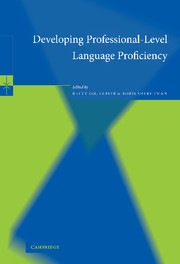Book contents
- Frontmatter
- Contents
- Notes on contributors
- Foreword
- Acknowledgments
- I Principles, practices, and theory
- 1 Principles and practices in teaching Superior-level language skills: not just more of the same
- 2 Toward academic-level foreign language abilities: reconsidering foundational assumptions, expanding pedagogical options
- II Programs
- III Learners and users
- References
- Index
2 - Toward academic-level foreign language abilities: reconsidering foundational assumptions, expanding pedagogical options
Published online by Cambridge University Press: 03 December 2009
- Frontmatter
- Contents
- Notes on contributors
- Foreword
- Acknowledgments
- I Principles, practices, and theory
- 1 Principles and practices in teaching Superior-level language skills: not just more of the same
- 2 Toward academic-level foreign language abilities: reconsidering foundational assumptions, expanding pedagogical options
- II Programs
- III Learners and users
- References
- Index
Summary
Among the most enduring and pronounced disjunctures in American college foreign language (FL) programs is that between the lofty desire for students to attain upper levels of performance in a second language (L2) and realities on the ground. On the one hand, the ideal of upper-level L2 abilities – henceforth generically referred to as advanced second language (AL 2) use – is alive and well as indicated in departmental mission and goals statements and also in the profession's continued insistence on “near-native abilities” in candidates for faculty positions (Koike and Liskin-Gasparro [1999]). On the other hand, we know that the first few semesters at best enable students to acquire basic interactional facility in the L2 and that the subsequent content courses rarely even state appropriate acquisitional goals much less incorporate explicit instructional interventions that target AL 2 learning.
However, a mismatch that may have been tolerable in the past may no longer be workable in the future, as external demands press in on the profession, with serious consequences for FL departments, including the outsourcing of language instruction, the dramatic reorganization of some departments, and even their closing (Schneider [2001]). For the real meaning to FL departments of the much-hailed globalization, the greater ethnic and linguistic diversity of nations, and the demands for more democratization around the world may not simply be that societies require a multilingual citizenry but that this citizenry of the future requires upper levels of language abilities so as to be able to use an L2 competently in a wide variety of public and professional contexts and not only in private settings among family and friends.
- Type
- Chapter
- Information
- Developing Professional-Level Language Proficiency , pp. 34 - 58Publisher: Cambridge University PressPrint publication year: 2002
- 20
- Cited by



